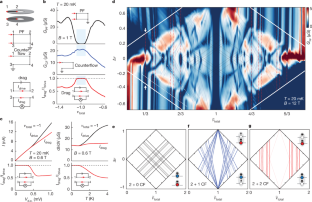Excitons in the fractional quantum Hall effect
IF 48.5
1区 综合性期刊
Q1 MULTIDISCIPLINARY SCIENCES
引用次数: 0
Abstract
Excitons, Coulomb-driven bound states of electrons and holes, are typically composed of integer charges1,2. However, in bilayer systems influenced by charge fractionalization3,4, a more interesting form of interlayer exciton can emerge, in which pairing occurs between constituents that carry fractional charges. Despite numerous theoretical predictions for these fractional excitons5–16, their experimental observation has remained unexplored. Here we report transport signatures of excitonic pairing in fractional quantum Hall effect states. By probing the composition of these excitons and their impact on the underlying wavefunction, we discover two new types of quantum phases of matter. One of these can be viewed as the fractional counterpart of the exciton condensate at a total filling of 1, whereas the other involves a more unusual type of exciton that obeys non-bosonic quantum statistics, challenging the standard model of bosonic excitons. Excitonic pairing in fractional quantum Hall states shows two new quantum phases, including a fractional exciton condensate and an unusual type of exciton that obeys fermionic or anyonic quantum statistics.


分数量子霍尔效应中的激子
激子,电子和空穴的库仑驱动束缚态,通常由整数电荷1,2组成。然而,在受电荷分数化影响的双层系统中,可以出现一种更有趣的层间激子形式,其中在携带分数电荷的组分之间发生配对。尽管对这些分数激子5,6,7,8,9,10,11,12,13,14,15,16有许多理论预测,但它们的实验观察仍然未被探索。本文报道了分数量子霍尔效应态中激子对的输运特征。通过探测这些激子的组成及其对潜在波函数的影响,我们发现了两种新的物质量子相。其中一个可以被看作是总填充为1的激子凝聚的分数对应物,而另一个则涉及一种更不寻常的激子类型,它遵循非玻色子量子统计,挑战玻色子激子的标准模型。
本文章由计算机程序翻译,如有差异,请以英文原文为准。
求助全文
约1分钟内获得全文
求助全文
来源期刊

Nature
综合性期刊-综合性期刊
CiteScore
90.00
自引率
1.20%
发文量
3652
审稿时长
3 months
期刊介绍:
Nature is a prestigious international journal that publishes peer-reviewed research in various scientific and technological fields. The selection of articles is based on criteria such as originality, importance, interdisciplinary relevance, timeliness, accessibility, elegance, and surprising conclusions. In addition to showcasing significant scientific advances, Nature delivers rapid, authoritative, insightful news, and interpretation of current and upcoming trends impacting science, scientists, and the broader public. The journal serves a dual purpose: firstly, to promptly share noteworthy scientific advances and foster discussions among scientists, and secondly, to ensure the swift dissemination of scientific results globally, emphasizing their significance for knowledge, culture, and daily life.
 求助内容:
求助内容: 应助结果提醒方式:
应助结果提醒方式:


